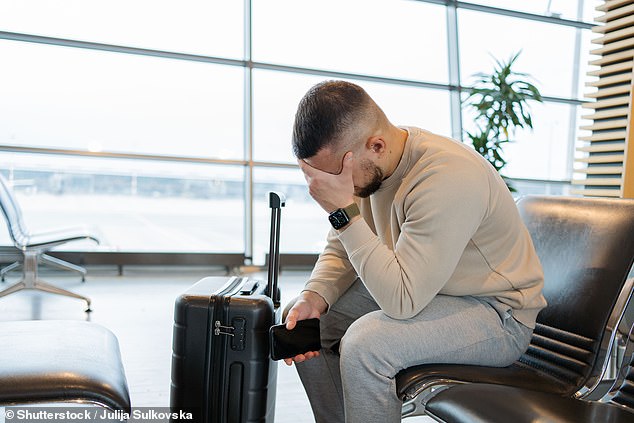[ad_1]
Ever felt incredibly bloated after a flight?
You might have been suffering from ‘jet belly’, a common affliction where cabin pressure causes your stomach to bloat.
‘On long-haul flights, it’s important to be aware of “aeroplane bloat”, categorised as a build-up of gas in the intestines and stomach, caused by a combination of factors,’ explains Dr Donald Grant, senior clinical advisor at The Independent Pharmacy.
‘At 30,000 feet, plane pressure drops dramatically, causing the gas in our guts to expand. In turn, this causes bloating and discomfort, which can lead to aeroplane bloat.
‘It’s kind of like how crisp packets expand while in the air – the same effect is happening to our guts!’
And sitting still for hours during a long flight doesn’t help matters either, reveals Dr Grant.
He explains: ‘This fixed position can slow digestion and increase gas buildup, further adding to the discomfort and bloating.’
So, how can you escape jet belly this summer?

Ever felt incredibly bloated after a flight? You might have been suffering from ‘jet belly’, a common affliction where cabin pressure causes your stomach to bloat

Dehydration increases your risk of bloating as it slows down your digestion
Hydrate
Dehydration increases your risk of bloating as it slows down your digestion.
Dr Grant explains: ‘Drinking substantial amounts of water can make a huge difference, limiting the risk of bloating.
‘I advise against fizzy drinks as the carbonation can increase gas buildup. Realistically, adults should be aiming for 2-2.5 litres of fluid each day, but prioritise still water before a flight.’
Opt for light meals
‘Stay away from salty foods and anything hard to digest, including beans, cabbage, dairy products or fatty foods,’ says Dr Grant.
The doctor recommends eating light food such as rice and protein like chicken and fish as they’re ‘easier to digest’.
Try and move every hour

The doctor recommends eating light food such as rice and protein like chicken and fish as they’re ‘easier to digest’
While it can be hard to exercise on a plane, Dr Grant recommends ‘walking to the toilet’ every hour or two to reduce your risk of bloating.
He explains: ‘By moving, we’re aiding our digestive system, allowing it to work more efficiently. This actively reduces the risk of bloating.’
Consider probiotics
If you have a ‘long history of gut issues’, Dr Grant suggests using probiotics to ‘target’ and ‘reduce’ discomfort and bloating.
He adds: ‘Overall, with the holiday season underway, it’s important to be aware of aeroplane bloat and the factors that can increase the risks.
‘However, by drinking enough still water, avoiding any trigger foods and packing emergency over-the-counter medication, I believe people can dramatically reduce the risk of experiencing this strange phenomenon.’
[ad_2]
This article was originally published by a www.dailymail.co.uk . Read the Original article here. .

